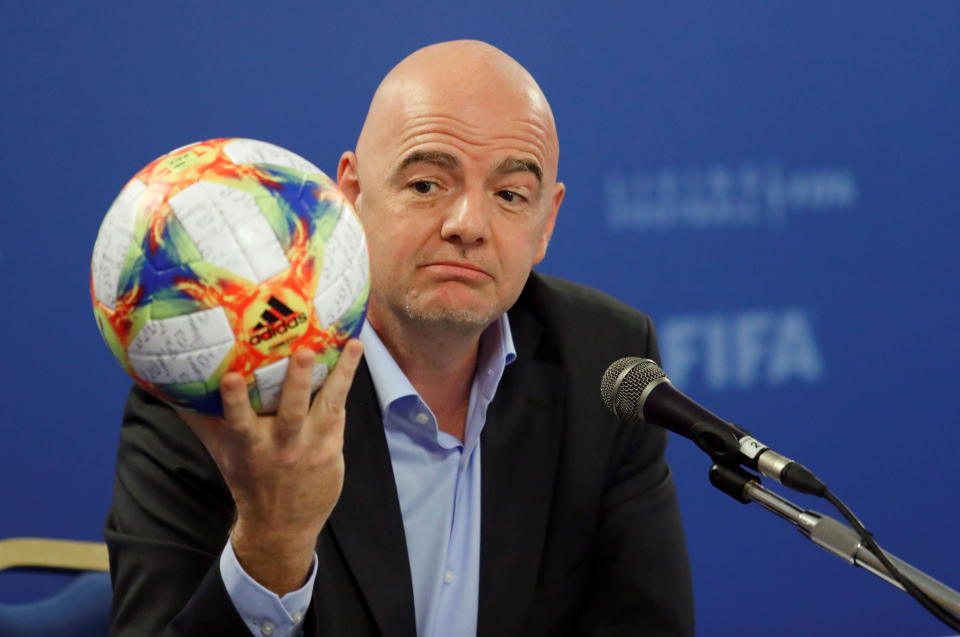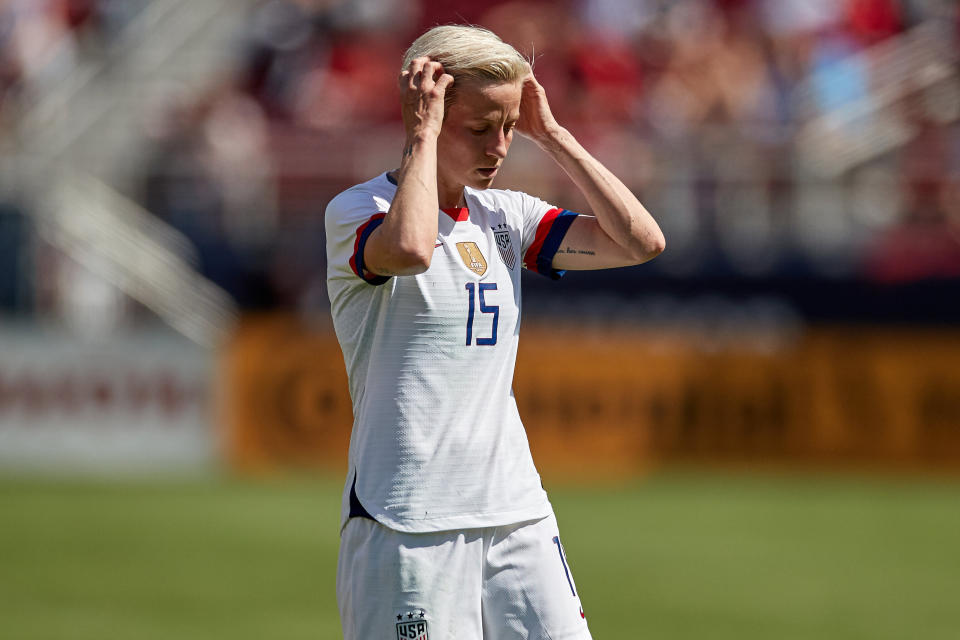The sexist imbalance in how FIFA treats women's soccer is as stark as ever
When fans started realizing the unthinkable – that FIFA had split up group tickets at the Women's World Cup and scattered fans around the stadiums away from loved ones – the accusations of sexism came quickly.
"Just wondering, would the FIFA Women’s World Cup ticketing disaster be happening if this was the men’s World Cup?" one fan tweeted rhetorically.
"And you know this would NEVER happen at the men's games," another fan wrote. "Can you imagine the outrage? The safety issues? Why is it ok for my friends and I to be separated because it's a women's match?"
"Do you hate women?" another angry fan tweeted. "Cannot imagine this BS happening during the Men's World Cup."
It's still unclear how FIFA, the world governing body of soccer, managed such a massive blunder. A FIFA statement to Yahoo Sports said officials are still in communication with the local organizing committee to assess "the scope of this matter."
But whether or not it had to do with FIFA caring less about the women's game and treating the Women's World Cup as an afterthought, it's easy to see why fans think so.
Whether it's inappropriate comments from the president of FIFA about how the women should play in tighter shorts, or FIFA paying the women small fractions of what it pays men, or giving the women worse conditions for tournaments, FIFA's past is filled with instances of double standards and sexism that, so far, haven't been proven wrong.
"FIFA doesn't really show that they care about the women's game," said U.S. winger Megan Rapinoe in October during World Cup qualifying. "That's not to say they don't do anything. They do things for the women's game, but in the way they truly care about the men's game, they don't truly care about the women's game."

One obvious way to see that is through the prize money it offers for its flagship events, the senior World Cups on the men's and women's sides.
At last year's World Cup, the French men's team that lifted the trophy earned $38 million. Meanwhile, whichever women's team wins the trophy this summer will get only $4 million, which is roughly 11 percent of what the men earned.
The disparities are more galling when you look at the losers. When the U.S. women won in 2015 after a seven-game gauntlet, they got around $2 million. When the U.S. men's team got knocked out in the round of 16 after four games the year before, they got $8 million. That's right: The losing U.S. men's team got four times what the winning U.S. women's team made.
FIFA doubled its total prize money for the Women's World Cup from 2015 to this year's edition, now offering $30 million for all teams. But it also raised the prize money for the men to $400 million, so much that the gap between the prizes for men and women actually got bigger.
"They're probably looking for pats on the back for the increase, but they're not going to get it here," Rapinoe said after the prizes were announced. "I mean, until they're really going to take meaningful steps to truly show they care about the women's game in a deeper way, I don't know. $15 million is nothing to them."
Indeed, FIFA's rainy day reserves currently have around $3 billion – yes, that's billions with a "B." The reason FIFA hasn't increased its women's soccer funding has nothing to do with whether or not the non-profit organization can afford it – it's clearly a choice FIFA has made.
FIFA often cites the staggeringly high revenue that the men's World Cup brings in as the reason the prize money is so large for the men. But no one knows how much revenue the Women's World Cup earns because FIFA doesn't have separate revenue streams for each tournament.
Instead, FIFA signs sponsors for both World Cups as a bundle, and then FIFA apparently assumes those sponsors care about only the men's World Cup.
"That's something never really analyzed," said former FIFA executive Tatjana Haenni in March. "What is the potential value of the Women's World Cup? Nobody knows the Women's World Cup commercial value because it's not sold separately. This is something that should at least be discussed."
Of course, there's also something eyebrow-raising about FIFA citing revenues at all while it skimps out on directing money to women's programming when it can afford to do so. FIFA is a non-profit that exists ostensibly not to make money but to spread the game of soccer.
"If FIFA's mission to grow the game for both the men and the women, they need to incentivize federations to put money into their women's programs," said U.S. defender Becky Sauerbrunn.

But it's not just money matters.
The Women's World Cup is a marquee event and the one time every four years when the entire world becomes enthralled with women's football. But for some bizarre reason, FIFA, who sets the international calendar for soccer, decided the Women's World Cup final shouldn't get its own spotlight on July 7.
FIFA decided to schedule the Copa America final in South America and the CONCACAF Gold Cup final on the same day as the Women's World Cup final.
On the biggest day in women's soccer, FIFA decided everyone's attention should be shared with the best men's teams across the Americas. FIFA couldn't figure out a way to move the schedule by even a day to give women's soccer its due.
But these are only the problematic decisions affecting women in soccer right now. FIFA's past is littered with other examples of a frustrating double standard.
Go back just four years ago when the women had to play a World Cup on artificial turf, which the men have never had to do. Go back a little further and Sepp Blatter, the ex-president of FIFA, unapologetically announced his insulting plan to grow women's soccer: "Let the women play in more feminine clothes like they do in volleyball. They could, for example, have tighter shorts."
Given FIFA's track record – and this latest ticket debacle that’s hard to imagine happening at a men's World Cup – this surely isn't the last time FIFA will be accused of sexism. Unfortunately, there's little reason to expect meaningful change anytime soon.
"I think it's a choice. They're choosing not to put effort in," Rapinoe said. "They're choosing not to think deeper about the women's games. These are all choices that they are continually making."
Caitlin Murray is a contributor to Yahoo Sports and her book about the U.S. women’s national team, The National Team: The Inside Story of the Women Who Changed Soccer, is out now. Follow her on Twitter @caitlinmurr.
More from Yahoo Sports:

 Yahoo Finance
Yahoo Finance 